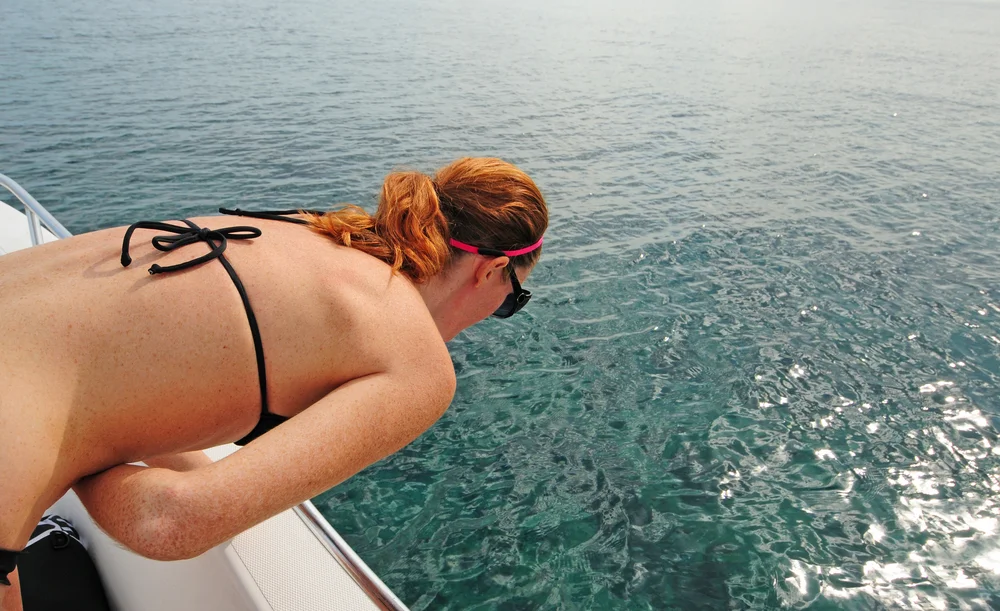Do you worry about getting seasick? If you are new to boating or have been doing it for a while, you may not know about some of the ways you can quickly calm down your seasickness and start to feel normal again. If you’re brand new to boating, you may not know the feeling of getting seasick.
It is a common problem as your brain is trying to figure out how you are standing on solid ground but also rocking back and forth, like when you stand or sit in the boat and the waves are pushing it around.
There are a few common tricks, such as remembering to look out at the sea rather than reading a book or looking through your camera, as well as taking some medicine like Dramamine to help with middle ear balance, but there are some tips you may have never heard before. Try these three methods for keeping everyone on board from getting seasick next time you’re on the water.
Avoid being in direct sun
The first tip to try is to avoid being in direct sun. One of the issues with being out at sea is that it’s hard to stay away from the sun and overexposure to the sun can have consequences. It’s great to bring sunblock, but you should also be focused on getting as much shade as possible and wear a protective covering to avoid overexposure.
If you find yourself getting seasick, you may be overheating and you’ll need to find shade right away. Sip water to stay hydrated since dehydration can be a cause of seasickness. The closer you get to the equator, the strong the sun will be.
Wear a large floppy hat and wear lightweight, long sleeve tops to help prevent too much sun. Keep your eyes away from that book you were reading, the binoculars, or the cameras during this time and just close your eyes with sometimes looking at the horizon.
Try wearing pressure bands
Another trick for seasickness is wearing an anti-nausea band. They come in a variety of options, but these adjustable wristbands can be worn to help with your seasickness symptoms. They are sometimes referred to as “sea bands” or a PSI band. Essentially, the pressure bands work as acupressure on your wrist that touches points to relieve the symptoms of nausea and vomiting.
While acupressure bands haven’t been proven effective, many people swear by their powers. Otherwise, you could always try regular medicine like Dramamine and Bonine, or even a patch called Scopolamin, a Transderm scop patch that goes behind the ear that works similarly. This patch will reduce the activity of your inner ear’s nerve fibers similar to the pills mentioned. It could have side effects like blurred vision or dry mouth though.
If you don’t have access to these, you can actually try applying some pressure yourself. There is a spot called the P6 that is known for suppressing motion sickness. The bands will do this for you, as well as a battery-operated one called the Reliefband that transmits an electrical pulse.
Consider your stomach
Sometimes the problem with seasickness is that your stomach needs attention. You may need to simply eat something bland, like bread or bagels or something with added peppermint or ginger. Avoid anything acidic like orange juice or coffee, and if possible avoid anything acidic, fatty, or spicy leading up to the cruise. For others, eating is not the solution but drinking a Coke might be the solution.
That’s because Coke has both sugar and phosphoric acid which is similar ingredients to what you’d find in an anti-nausea drug sold over-the-counter. Just make sure not to drink anything alcoholic since a mild hangover and the fatigue that comes with it can both translate to seasickness. Also, avoid strong smells, like perfume or exhaust that could irritate your nausea more.
If nothing else works, try getting some fresh air with your eyes closed on the deck. Play some music to take your mind off of the symptoms. Eventually, you might start to feel yourself again. These three tips are some of the best ways to keep from getting sick while on the water.

